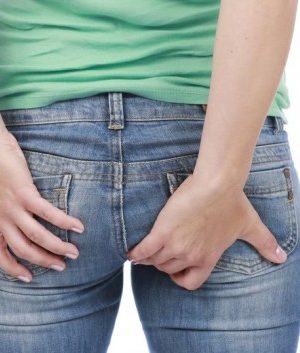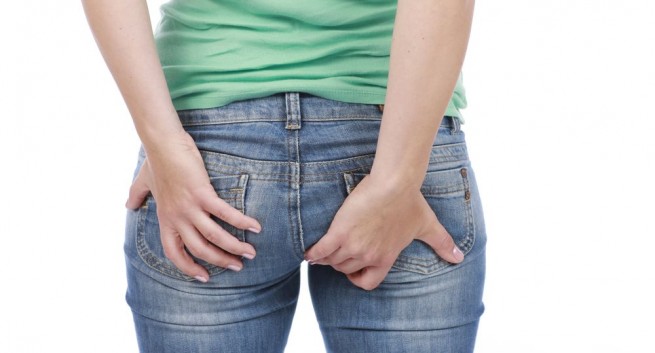An anal fissure is a cut or tear occurring in the anus (the opening through which stool passes out of the body) that extends upwards into the anal canal. Fissures are a common condition of the anus and anal canal and are responsible for 6% to 15% of the visits to a colon and rectal (colorectal) surgeon. They affect men and women equally and both the young and the old. Fissures usually cause pain during bowel movements that often is severe. Anal fissure is the most common cause of rectal bleeding in infancy.
Symptoms
An anal fissure may cause one or more of the following symptoms:
- a visible tear in the skin around the anus
- a skin tag, or small lump of skin, next to the tear
- sharp pain in the anal area during bowel movements
- streaks of blood on stools or on tissue paper after wiping
- burning or itching in the anal area
Causes
Anal fissures are most commonly caused by damage to the lining of the anus or anal canal.
Most cases occur in people who have constipation, when a particularly hard or large stool tears the lining of the anal canal.
Other possible causes of anal fissures include:
- persistent diarrhoea
- inflammatory bowel disease (IBD), such as Crohn’s disease and ulcerative colitis
- pregnancy and childbirth
- occasionally, a sexually transmitted infection (STI), such as syphilis or herpes, which can infect and damage the anal canal
- having unusually tight anal sphincter muscles, which can increase the tension in your anal canal, making it more susceptible to tearing
In many cases, no clear cause can be identified.
Surgical Treatment
Although most anal fissures do not require surgery, chronic fissures are harder to treat and surgery may be the best option. The goal of surgery is to help the anal sphincter muscle relax which reduces pain and spasms, allowing the fissure to heal. Surgical options include Botulinum toxin (Botox®) injection into the anal sphincter or surgical division of an inner part of the anal sphincter (lateral internal sphincterotomy). Your colon and rectal surgeon will find the best treatment for you and discuss the risks of surgery. Both types of surgery are typically done as same-day outpatient procedures.
Natural Remedies
Psychology
Do not sit at home and wallow in pain and sadness. Go to work, see your friends, live a normal life but be careful. Positive mentality keeps you relaxed and promotes healing.
Fiber
Following a high-fiber diet will encourage regular bowel movements. Regular fiber intake results in softer stools that are passed easily, so you do not have to use much pressure during a bowel movement, thus avoiding damage to the lining of the anus.
Hygiene
To promote healing of anal fissures, it is important to maintain proper hygiene. First of all, keep the affected area clean and dry, as moisture can increase the risk of bacterial infections.
Stay Hydrated
Drink plenty of caffeine-free fluids throughout the day. (Too much alcohol and caffeine can lead to dehydration.)
Don’t Strain or Sit on the Toilet Too Long
This can increase pressure in the anal canal.
Olive Oil
Olive oil is rich in healthy fats that will lubricate your bowel system, allowing the stool to pass easily. In addition, its anti-inflammatory properties can help reduce pain caused by anal fissures.
A 2006 study published in the Scientific World Journal showed that patients with anal fissures noticed reduction in pain, bleeding and itching after using a mixture of olive oil, honey and beeswax.
Coconut Oil
Coconut oil is another helpful home remedy for anal fissures. Being rich in medium-chain triglycerides, this oil easily penetrates into the skin, keeps the affected area lubricated and starts the healing process.
Wheat Germ Oil
Wheat germ oil helps in quick healing of the anal fissures, and is a very effective home remedy for this treatment. Just apply a little wheat germ oil all over the affected area and leave it on for half an hour. Wipe dry with a soft and wet tissue after this duration. This application should be done at least twice a day.
Apple Cider Vinegar
Constipation and straining during bowel movements can cause or worsen anal fissures. Apple cider vinegar is an effective treatment for constipation.
Flaxseed
Flaxseed contains fiber and omega-3 fatty acids that can help treat constipation, which often causes and worsens anal fissures. It has a laxative property, which eases the need to strain during a bowel movement.
Aloe Vera
Aloe vera has natural healing powers and pain-relieving properties that can ease symptoms of anal fissures and help repair damaged skin tissue.
A 2014 study published in the European Review for Medical and Pharmacological Sciences found that a topical cream containing aloe vera juice was an effective treatment for chronic anal fissures.
Hot Sitz Bath
To alleviate the discomforts and promote healing, try a hot sitz bath. It will help increase blood flow to the anal area, which aids healing of minor tears or splits in the tissue. It also helps reduce pain, swelling and itching.
Comfrey
Comfrey is a popular herb that can promote healing and relieve pain when suffering from anal fissures. Both the root and leaves have medicinal properties that help regenerate skin tissues and promote rapid cell growth. This accelerates the healing process.
L-arginine Gel
Arginine, also known as L-arginine, is an amino acid that promotes healing of anal fissures by increasing nitric oxide flow to the affected site.
A 2005 study published in Diseases of the Colon and Rectum found that local application of L-arginine gel promotes fissure healing without side effects. The gel is even effective in patients not responding to isosorbide dinitrate treatment.
Petroleum Jelly
Anal fissures are very painful, and hard stools worsen the condition, causing even more pain. This may even result in bleeding. Therefore, using lubrication when you are going to toilet helps to prevent any such injury. Apply some petroleum jelly into your rectum every time you are going to pass stools.
Laxatives
If you are severely constipated, the hard stools and strain during bowel movements will cause further harm to your condition by tearing the anal fissures further. You can use some laxatives to soften the stools. This will allow a totally painless bowel movement. Do consult your doctor before using any laxative.
Use a Pillow
When you have an anal fissure, sitting can be very painful, especially if the surface is hard. You can use a soft pillow to sit on as it will put less pressure and help alleviate the pain. A variety of specially made pillows are available for people suffering from this problem. You can get a liquid filled pillow, doughnut shaped pillow, or a kind that suits you the best.


